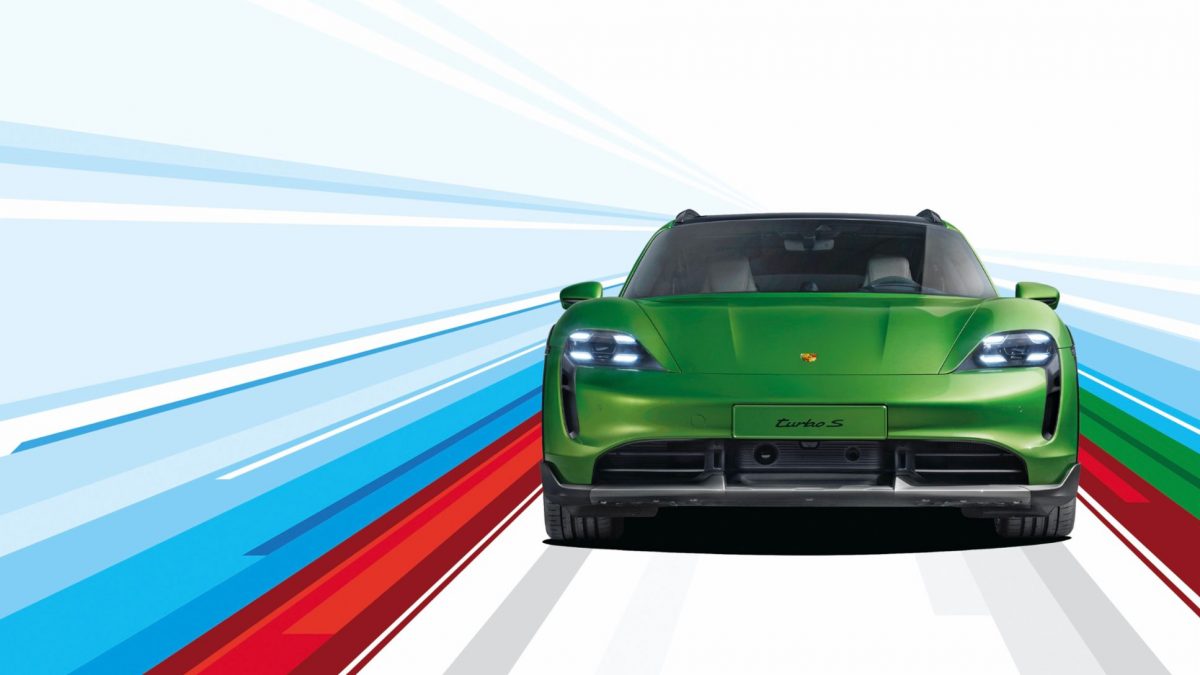The flat front, muscularly curved wings and a roofline that slopes down towards the rear – even at first glance, the design of the new Porsche Taycan Cross Turismo bears the DNA of the iconic 911. In addition, the flat headlights with vertical air intakes clearly mark it as a member of the Taycan family. And yet the second electric sports car from Zuffenhausen is a Porsche unlike any other.

As the company’s first Cross Utility Vehicle (CUV), the five-door combines classic Porsche driving dynamics with an off-road-capable high-tech chassis. “The Cross Turismo is the perfect complement to our existing Taycan family,” explains Stefan Weckbach, former head of the model range. “It is more versatile, more robust, and yet nearly as sporty as the saloon.”
A spirit of adventure in every detail of the Cross Turismo
A spirit of adventure is to be found in every detail of the Cross Turismo. Creating space for diving, golfing, surfing, or cycling equipment was high on the list of requirements. The load volume is therefore as generous as you’d expect: behind the large tailgate, the Cross Turismo holds almost 1,200 litres of luggage when the rear seatbacks are folded down. The vehicle also offers all-wheel drive, air suspension and Performance Battery Plus as standard (Taycan Cross Turismo Models: CO2 emissions combined 0 g/km, electricity consumption combined 29.4 – 28.1 kWh/100 km).
Two-wheel enthusiasts will find a special solution in the Cross Turismo: roughly where the exhaust pipes are located on vehicles with combustion engines, two rails for a bicycle rack can be mounted on the CUV, providing space for three e-bikes. “We want to attract people who are looking for a versatile and fully electric companion for everyday life, but also for travel and leisure adventures,” says Weckbach.

And that includes trips off the beaten track. For leaving everyday paths behind, the CUV’s adaptive air suspension is height-adjustable, and there is even a gravel mode for particularly poor surfaces. With the optional Offroad Design Package, the Cross Turismo gains 30 millimetres of ground clearance. As speed increases on level ground, the vehicle automatically lowers in favour of aerodynamic efficiency. “Combining the requirements in terms of sportiness with off-road capability,” says Weckbach, “was the biggest development challenge.”
The pace of development was rapid
Porsche presented the Mission E Cross Turismo design study for the first time at the Geneva International Motor Show in the spring of 2018. “The concept vehicle stood out especially for its attractive design with striking off-road elements,” recalls Weckbach. The response was very good, and so the Supervisory Board of Porsche AG decided in October 2018 to go ahead with series production – at a time when the Taycan sports saloon was also still in development. This is a clear indicator of the focus with which the sports car manufacturer is driving electrification forward.

In terms of length and width, the Cross Turismo corresponds to the saloon and can also rival its performance data: from a standstill it catapults forwards, accelerating up to 1.2 times faster than the force of gravity and sprinting from 0-100 km/h in 3.0 seconds. The centre of gravity is low – right where the performance battery is integrated into the underbody. The two electric motors on the front and rear axles have permanently actuated synchronous machines and together mobilise a system output of up to 560 kW (761 PS). The ranges are based on the values of the saloon.

The CUV combines the precise handling of a sports car with the long-distance comfort of a sedan and offers nearly as much space as an SUV. “Thanks to the new body shape, we were able to create over thirty millimeters more headroom on the rear seats,” explains Weckbach. “And the large panoramic glass roof creates a very spacious feeling.”
The CUV combines the precise handling of a sports car with the long-distance comfort of a saloon and offers nearly as much space as an SUV. “Thanks to the new body shape, we were able to create more than 30 mm more headroom on the rear seats,” says Weckbach. “And the large panoramic glass roof creates a very spacious feeling.”
Info
Text first published in the Porsche magazine Christophorus, No. 398.


